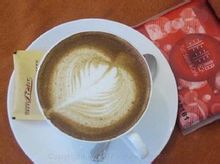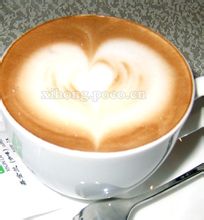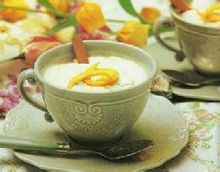The origin of cappuccino coffee
Cappuccino-At the beginning of the 20th century, Italian Archie Gaxia invented the steam pressure coffee machine and also developed cappuccino coffee. Cappuccino is a strong coffee, poured into the steam foam milk, the color of the coffee at this time is like the color of the dark brown Taoist robe worn by the monks of St. Francis Church, and the pointed milk bubbles above the coffee are like the small pointed hat on the monk's head, that is, named after the monk's clothing name Cappuccino.
Cappuccino is made by adding a thick layer of frothed milk to the espresso. Espresso quality

Cappuccino volume doesn't show up well with milk and foam, but it's still an important factor in determining cappuccino taste. Pour partially defatted milk into a jug, then use a frother to foam, rinse, and allow the milk to be as uniform as whipped cream without burning. Cappuccino cups should be warm, otherwise the milk bubbles will spread. These cups can be placed on top of the coffee machine to keep warm, and the milk and foam are poured on top of the espresso coffee, which naturally forms a layer of white liquid that looks as if it is wrapping the coffee below. Note that pour the brewed Italian coffee about five minutes full and the frothed hot milk about eight minutes full. Finally, sprinkle a little finely diced cinnamon powder or chocolate powder as you like. The rest of the milk can also be poured in. In this way, a delicious cappuccino is made.
At the beginning of the 20th century, Italian Archibucha invented steam pressure coffee machine, but also developed cappuccino coffee.

Cappuccino Cappuccino is an Italian coffee that is blended with the same amount of espresso and steam foam milk. The color of coffee at this time, like cappuccino church friars in the dark brown coat covered with a turban, coffee hence the name. A traditional cappuccino is one-third espresso, one-third steam milk and one-third frothy milk. The rich taste of espresso, accompanied by lubricating milk foam; there is a hint of semen extraction. Frothed milk sprinkled with cinnamon, mixed with the aroma of Italian coffee from the bottom up, a new generation of coffee people are excited about this.
It has a unique charm that people can't resist. At first, it smells very fragrant. When you drink it for the first time, you can feel the sweetness and softness of a lot of milk foam. The second mouth can really taste the original bitterness and richness of coffee beans. Finally, when the taste stays in your mouth, you will feel more fragrant and meaningful. A coffee can drink a variety of unique taste, do not think it is amazing? The first bite always makes people feel bitter with sour taste, a lot of bubbles like young people pick life, and the bursting of bubbles and that little bitterness is like a conflict between dream and reality. Finally tasted the joys and sorrows of life, the sweet life back to sweet but let people intoxicated.
Cappuccino coffee has a good taste, but its origin is more learned, and it has always been the best body material for studying text changes in Europe and America.
The history of Cappuccino is sufficient to show that a word often ends up with other meanings because it looks like something else

Cappuccino coffee, far beyond the original intention of the word maker. Sounds complicated, see below.
Capuchin monks, founded after 1525, wore brown robes and pointed hats. When Capuchin arrived in Italy, the local people thought the friars 'clothing was very special and gave them the name Cappuccino, which means loose robes and small pointed hats worn by monks in Italian. It comes from the Italian word "turban" or Cappuccio.
However, Lao Yi loves coffee and finds that when espresso, milk and milk foam are mixed, the color is like the dark brown Taoist robe worn by monks, so he has an inspiration and gives milk coffee and pointed milk foam drinks, named Cappuccino. The word was first used in English in 1948, when a San Francisco newspaper first introduced cappuccino, and it was not until 1990 that it became a familiar coffee drink. It should be said that the word Cappuccino coffee comes from the Franciscan church (Capuchin) and the Italian head scarf (Cappucio). The original coined word Cappuccino believed that the monk's robe would eventually become a coffee drink name.
Viennese Fanz George Kolschitsky is the founder of Cafe Latte with milk and coffee. In this issue, we will talk about the origin of cappuccino. These two drinks are coffee and milk, but cappuccino origin is more knowledgeable, has been the best body material for European and American research on the change of writing.
Cappuccino coffee is a variation of Italian coffee, that is, in the strong coffee, poured into the steam foam milk, at this time the color of coffee like cappuccino church friars dark brown coat covered with the same turban, coffee hence the name.
Did you know that cappuccino can be drunk dry or wet? The so-called dry cappuccino (Dry Cappuccino) refers to more milk foam, less milk conditioning method, drink coffee flavor thick milk fragrance, suitable for heavy taste drinking. As for wet cappuccino (Wet Cappuccino), it refers to the practice of less milk foam and more milk. The milk fragrance covers the strong coffee flavor and is suitable for light tastes. Wet cappuccino tastes like latte. Generally speaking, cappuccino tastes heavier than latte. If you are heavy, order cappuccino or dry cappuccino. If you are not used to strong coffee flavor, you can order latte or wet cappuccino.
5 Benefits Edit 1. Coffee contains certain nutrients. Nicotinic acid in coffee contains vitamin B, which is higher in roasted beans. And there are free fatty acids, caffeine, tannic acid and so on.
2. Coffee is good for the skin. Coffee can promote metabolic function, activate digestive organs, constipation has a great effect. Bathing with coffee powder is a kind of thermotherapy, which has the effect of losing weight.

Cappuccino coffee 3. Coffee has the function of hangover. Drinking coffee after drinking will quickly oxidize acetaldehyde converted from alcohol and decompose it into water and carbon dioxide and expel it from the body.
4. Coffee can eliminate fatigue. To eliminate fatigue, it is necessary to supplement nutrition, rest and sleep, and promote metabolic functions, and coffee has these functions.
5. Three cups of coffee a day can prevent gallstones. Caffeine in coffee stimulates gallbladder contraction and reduces cholesterol in bile, which can easily form gallstones. Men who drink two to three cups of coffee a day have a 40 percent lower risk of developing gallstones, Harvard University researchers have found.
6. Drinking coffee regularly can prevent radiation damage. Radiation damage, especially the radiation of electrical appliances, has become a more prominent pollution. Indian atomic researchers reached this conclusion in mouse experiments and said it could be applied to humans.
7. Coffee's health benefits. Coffee has the functions of antioxidation and heart protection, strengthening muscles and bones, benefiting waist and knees, stimulating appetite, eliminating fat, eliminating accumulation, removing dampness from orifices, activating blood circulation and removing blood stasis, stopping wind and stopping spasm, etc.
8. The emotional impact of coffee. Experiments have shown that the average person absorbs 300 mg (about 3 cups of brewed coffee) of caffeine a day, which will bring good effects on a person's nerves and emotions.
The Scientific Method of Drinking Coffee
Coffee is recognized as a healthy drink, but drinking coffee must be reasonable, scientific drinking can be beneficial to health, to achieve timely and appropriate amount. A cup of coffee after getting up in the morning is refreshing; a sip at work during the day can be refreshing, at this time coffee can be slightly strong; and coffee after dinner or at night should be slightly light. Coffee or tea have the role of refreshing, but not suitable for drinking with meals, should be drunk after meals.

Cappuccino Coffee Some friends love to drink coffee very much, but they are afraid that they will get angry when they drink it often. We often see a lot of people light coffee, this way of drinking coffee is not good for health. Should be in the coffee with a cup of boiled water, so there are two benefits: first, in the coffee before drinking a mouthful of boiled water, rinse off the odor in the mouth, and then taste will feel the coffee mellow. Second, due to the diuretic function of coffee, drink more boiled water, increase urine output, and promote kidney function. In this way, both taste the delicious coffee, and do not worry about getting angry, really kill two birds with one stone. When it comes to coffee, people think of caffeine, a mild stimulant in coffee that improves sensitivity, concentration, metabolism, mental state and physical fitness.
Caffeine is found in about 60 plant species, most notably tea and coffee. Caffeine allergy varies from person to person. For example, some people are allergic to pollen and some people are not suitable for seafood, and these two conditions will not affect most people. People often ask, how much coffee do you drink every day? In some coffee-consuming countries, people consume an average of about 250 to 600 milligrams of caffeine per day, and repeated scientific studies and analyses have shown that this dose does not have any side effects on humans.
The long-term disadvantages of drinking coffee
1. When you're nervous, you mess up.
Caffeine helps improve alertness, alertness, memory, and concentration, but drinking more than you're used to can have effects similar to taking the same dose of stimulants and cause nervousness. For people prone to anxiety disorders, caffeine can cause sweaty palms, palpitations, tinnitus and other symptoms, and make the situation worse.
2. Increased blood pressure
Caffeine is often combined with other simple painkillers because of its painkilling properties, but if you already have high blood pressure, using a lot of caffeine will only make your condition worse. Because caffeine alone can raise blood pressure, when combined with emotional stress, it can have a dangerous multiplier effect. Therefore, people at risk for high blood pressure should avoid caffeinated beverages especially when they are under high stress at work. Some regular coffee drinkers think they are immune to caffeine's effects, but that's not the case, with one study showing blood pressure can rise for up to 12 hours after drinking a cup of coffee.
3. induced osteoporosis
Caffeine itself has a good diuretic effect, but if you drink coffee for a long time and a lot, it is easy to cause osteoporosis, which will have an adverse effect on the preservation of bone mass. For women, it may increase the threat of osteoporosis. However, the premise is that the usual food is already lacking in adequate calcium intake, or people who do not often move, plus post-menopausal women, calcium loss caused by lack of estrogen, these conditions plus a lot of caffeine, may pose a threat to bones. If you can enjoy it in reasonable amounts, you can still do it without choking.
The following six people should not drink coffee
Suffering from hypertension, coronary heart disease, arteriosclerosis and other diseases-long-term or large amounts of coffee drinking, can cause cardiovascular disease. Older women-Coffee reduces calcium and causes osteoporosis. After menopause, women need ten times more calcium per day. Stomach sufferers-drinking too much coffee can cause stomach problems to worsen. Pregnant women-drinking too much coffee can lead to fetal abnormalities or miscarriage. Vitamin B1 deficiency-Vitamin B1 can maintain the balance and stability of the nervous system, and coffee has a destructive effect on it. Cancer Patients-Drinking too much coffee poses a cancer risk to normal people.
Coffee drinking for seniors should be noted.
1. It is not advisable to drink strong coffee. Strong coffee can speed up people's heartbeat, cause premature beats, arrhythmia and excessive excitement, insomnia, etc., thus affecting rest and recovery of physical strength.
2. Elderly people suffering from arteriosclerosis, hypertension and heart disease should not drink coffee. Studies have shown that drinking coffee in patients with heart disease can increase the incidence of myocardial infarction.
3. Elderly people suffering from ulcers should not drink coffee Coffee has the effect of stimulating gastric acid secretion, and gastric acid can cause the aggravation of ulcers, leading to pain, bleeding and so on.
4. After drinking, coffee should not be drunk because caffeine can increase the damage caused by alcohol. After drinking, coffee should be used to sober up, which is not good for health.
Important Notice :
前街咖啡 FrontStreet Coffee has moved to new addredd:
FrontStreet Coffee Address: 315,Donghua East Road,GuangZhou
Tel:020 38364473
- Prev

The Culture of Turkish Coffee
Turkish coffee, also known as Arabica coffee, is the ancestor of European coffee, which has a history of 700 to 800 years. It is said that in Turkey, it is extremely noble to make a cup of traditional Turkish coffee for guests, and some even bathe in advance.
- Next

Single cup of coffee
Individual coffee is made from a single coffee bean produced in the country of origin and is a pure coffee without milk or sugar when drinking. Have strong characteristics, special taste: or fresh and soft, or mellow smooth; the cost is higher, so the price is more expensive. For example, the famous Blue Mountain Coffee, Brazilian Coffee, Italian Coffee and Colombian Coffee are all named after the origin of coffee beans.
Related
- What documents do you need to go through to open a coffee shop? coffee shop coffee shop certificate processing process
- How to purchase Coffee beans in small Cafe how to choose a suitable supplier for domestic Coffee supply Company
- How to drink Starbucks Fragrance White Coffee? how to make Australian White Coffee? what Italian coffee beans are recommended?
- The Story of Flora Coffee: the name of Flora Coffee Bean and the implication of the Flowers on Florna Coffee
- How much does a cup of coffee cost? How much is the profit of a cup of coffee? What is the profit of the coffee shop in a year?
- Yunnan small Coffee, known as "fragrant Coffee", introduces the characteristics of Alpine Arabica Coffee producing areas in Yunnan, China
- 2023 latest Starbucks full menu price list how much is a cup of Starbucks coffee what is better to drink the most popular hot and cold drinks recommended
- Starbucks different kinds of Coffee Price list Starbucks menu 2023 Top Ten Best drinks in Starbucks
- Starbucks Spring praise Comprehensive matching Coffee Bean theme Story Packaging implication and taste description
- The cost of a cup of coffee latte American coffee cost price and selling price

